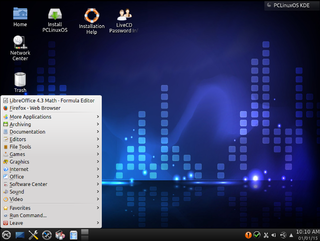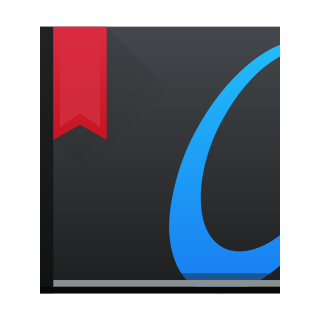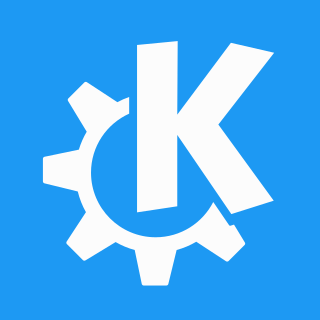A software house is a company whose primary products are various forms of software, software technology, distribution, and software product development. Software houses are companies in the software industry.
Invision Community is primarily an Internet community software produced by Invision Power Services, Inc. It is written in PHP and uses MySQL as a database management system. Invision Power Services sell applications that each can be bought and installed separately in addition to the Suite, the most widely known being the Internet forum software Invision Power Board. Invision Community refers to the combined collection of applications provided by Invision Power Services and is the core of the framework.

PCLinuxOS, often shortened to PCLOS, is an x86-64 Linux distribution, with KDE Plasma Desktop and MATE as its default user interfaces. It is a primarily free software operating system for personal computers aimed at ease of use. It is considered a rolling release.

Amarok is a cross-platform free and open-source music player. Although Amarok is part of the KDE project, it is released independently of the central KDE Software Compilation release cycle. Amarok is released under the terms of the GNU General Public License version 2.

Kexi is a visual database applications creator tool by KDE, designed to fill the gap between spreadsheets and database solutions requiring more sophisticated development. Kexi can be used for designing and implementing databases, data inserting and processing, and performing queries. It is developed within the Calligra project but is released separately.
Kolab is a free and open source groupware suite. It consists of the Kolab server and a wide variety of Kolab clients, including KDE PIM-Suite Kontact, Roundcube web frontend, Mozilla Thunderbird and Mozilla Lightning with SyncKolab extension and Microsoft Outlook with proprietary Kolab-Connector PlugIns.

KDE Software Compilation 4 was the only series of the so-called KDE Software Compilation, first released in January 2008 and the last release being 4.14.3 released in November 2014. It was the follow-up to K Desktop Environment 3. Following KDE SC 4, the compilation was broken up into basic framework libraries, desktop environment and applications, which are termed KDE Frameworks 5, KDE Plasma 5 and KDE Applications, respectively.

openSUSE, formerly SUSE Linux and SuSE Linux Professional, is a Linux distribution sponsored by SUSE Linux GmbH and other companies. It is widely used throughout the world. The focus of its development is creating usable open-source tools for software developers and system administrators, while providing a user-friendly desktop and feature-rich server environment.
A point release is a minor release of a software project, especially one intended to fix bugs or do small cleanups rather than add significant features. Often, there are too many bugs to be fixed in a single major or minor release, creating a need for a point release.
Software distributions, of which Linux distributions form a sizable proportion, are commonly referred to as distros, with rolling release distributions commonly referred to as rolling distros. When used as an adjective, instead of a noun, rolling release is often shortened to rolling, when referring to distributions, software, or development models.

Kdenlive (KDE Non-Linear Video Editor) is a free and open-source video editing software based on the MLT Framework, KDE and Qt. The project was started by Jason Wood in 2002, and is now maintained by a small team of developers.

Okular is the multiplatform document viewer developed by the KDE community and based on Qt and KDE Frameworks libraries. It is distributed as part of the KDE Applications bundle. It was originally based on KPDF and it replaced KPDF, KGhostView, KFax, KFaxview and KDVI in KDE 4. Its functionality can be easily embedded in other applications.

The KDE Software Compilation was an umbrella term for the desktop environment plus a range of included applications produced by KDE. From its 1.0 release in July 1998 until the release of version 4.4 in February 2010, the Software Compilation was simply known as KDE, which stood for K Desktop Environment until the rebrand. The then called KDE SC was used for all releases from 4.4 onward until the final release 4.14 in July 2014. It consisted of the KDE Plasma 4 desktop and those KDE applications, whose development teams chose to follow the Software Compilation's release schedule. After that, the KDE SC was split into three separate product entities: KDE Plasma, KDE Frameworks and KDE Applications, each with their own independent release schedules.

KOffice was a free and open source office suite and graphics suite by KDE for Unix-like systems and Windows. KOffice contains a word processor (KWord), a spreadsheet (KSpread), a presentation program (KPresenter), and a number of other components that varied over the course of KOffice’s development.
AlliedWare Plus is a fully featured Layer 3 operating system developed by Allied Telesis, used on its high-end enterprise network switches, and is the successor to AlliedWare. It is a package encompassing CLI and GUI management, routing, switching and internetworking functionality into a multitasking operating system for IPv4 and IPv6 Ethernet networks. It offers many standards-based features and protocols along with some proprietary technologies such as VCStack for highly resilient stacking solutions, EPSRing for resilient ring topologies, AMF for simplified network management, and Active Fiber Monitoring for secure fiber links.

KDE Frameworks is a collection of libraries and software frameworks by KDE that serve as technological foundation for KDE Plasma 5 and KDE Applications distributed under the GNU Lesser General Public License (LGPL).
openSUSE, a popular Linux distribution developed by the community-supported openSUSE Project and sponsored by a number of companies and individuals, most notably SUSE, AMD, B1 Systems, Heinlein Support and IP Exchange. attempts to maintain, promote, improve and document the openSUSE Linux distribution.









